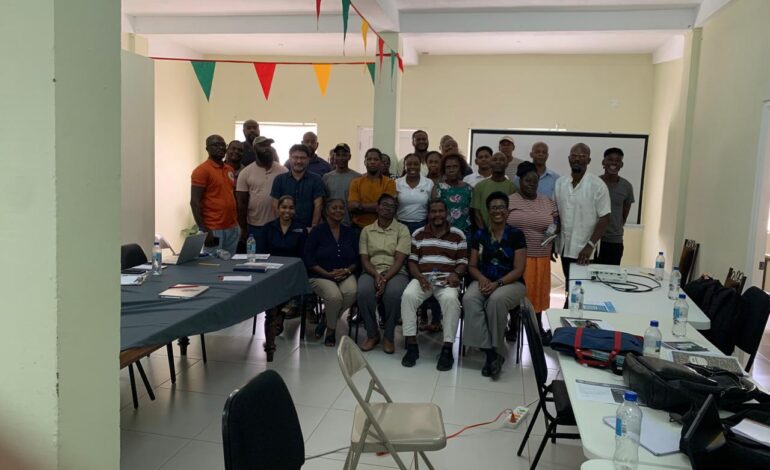
A series of training sessions and development of a surveillance programme and emergency response system for local stakeholders are earmarked to strengthen the soursop industry in Grenada
St. Georges, Grenada – March 24, 2025 – The Food and Agriculture Organization of the United Nations (FAO), in collaboration with the Caribbean Agriculture Health & Food Safety Agency (CAHFSA), continues to assist The Ministry of Agriculture & Lands, Forestry, Marine Resources & Cooperatives in fortifying its Sanitary and Phytosanitary (SPS) regulations in attempt to maintain Grenada’s sole access to the fresh soursop in the United States of America (USA). Grenada is still the only country authorized to export fresh soursop to this important market.
The Ministry of Agriculture & Lands, Forestry, Marine Resources & Cooperatives in Grenada is being supported through two projects entitled, “Enhancing SPS Capacity and Market Access for Grenadian Soursop Exports”, which are funded by the Standards and Trade Development Facility (STDF) and FAO Technical Cooperation Programme. These projects have several components which includes, strengthening surveillance, detection, diagnosis and emergency response system, piloting a certification and traceability systems, improving production practices and mitigating risks expanding export markets.
During a recent mission held from February 24 to 28 2025, a team of FAO and CAHFSA officials met with key stakeholders to assess farming practices and Grenada’s readiness for a phytosanitary emergency. The mission included field visits, interviews with staff from the pest control unit and exporters. To support this mission, validation workshop was held which focused on soursop pest surveillance and identification of training needs of the soursop industry. The workshop was attended by 27 participants, including farmers, exporters, extension officers, plant quarantine officers, and representatives from the Caribbean Agricultural Research and Development Institute (CARDI).
“The mission is part of the activities planned for this year to raise awareness and strengthen Grenada’s capacities to prevent the introduction of pests with the involvement of all actors in the soursop industry in partnership with CAHFSA,” said Mr Melvin Medina Navarro, FAO’s Plant Production & Protection Officer and Lead Technical Officer for both projects.
He added that, “The mission identified the need for training for field and laboratory technicians as a top priority. We are therefore working with the Ministry of Agriculture and our partners to put things in place to commence training in April”. Medina also stated that the participants were very engaged and enthusiastic throughout the session, and they showed a strong commitment to the success of the next SPS interventions in the country’s soursop industry.
During the validation workshop, Mrs Juliet Goldsmith, CAHFSA’s Plant Health Specialist, presented pest survey results and obtained relevant information from the participants to complete the Grenada’s situational analysis and to formulate tailored training programmes.
With the USA as its primary export market, Grenada’s soursop business is booming and strong, with an estimated yearly value of US 2.6 million. The island enjoys favorable access to this market due to the certified absence of two pests: the fruit borer (Cerconota anonella) and the seed borer (Bepratelloides cubense). FAO along with the Ministry of Agriculture, CAHFSA, STDF, and other interested parties are optimistic that this important and timely project will improve Grenada’s soursop value chain and secure its position in global markets.






